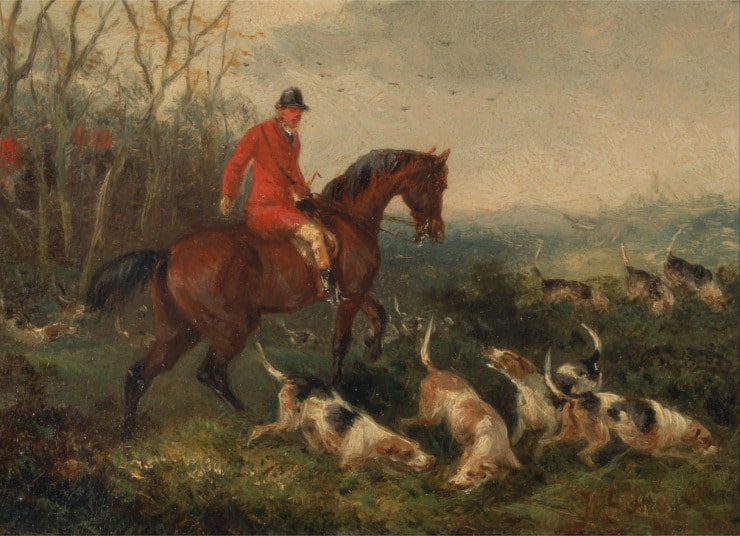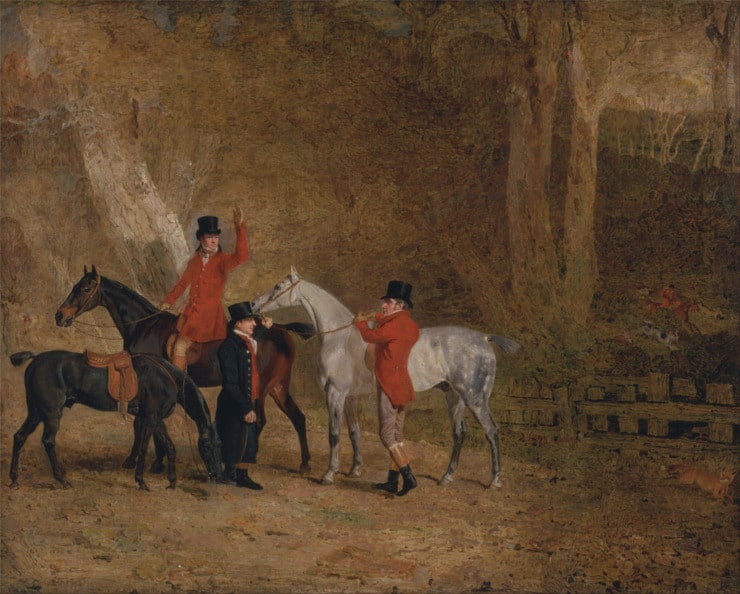The Ballad of the Foxhunter
“Now lay me in a cushioned chair
“And carry me, you four,
“With cushions here and cushions there,
“To see the world once more.
“And some one from the stables bring
“My Dermot dear and brown,
“And lead him gently in a ring,
“And gently up and down.
“Now leave the chair upon the grass:
“Bring hound and huntsman here,
“And I on this strange road will pass,
“Filled full of ancient cheer.”
His eyelids droop, his head falls low,
His old eyes cloud with dreams;
The sun upon all things that grow
Pours round in sleepy streams.
Brown Dermot treads upon the lawn,
And to the armchair goes,
And now the old man’s dreams are gone,
He smooths the long brown nose.
And now moves many a pleasant tongue
Upon his wasted hands,
For leading aged hounds and young
The huntsman near him stands.
“My huntsman, Rody, blow the horn,
“And make the hills reply.”
The huntsman loosens on the morn
A gay and wandering cry.
A fire is in the old man’s eyes,
His fingers move and sway,
And when the wandering music dies
They hear him feebly say,
“My huntsman, Rody, blow the horn,
“And make the hills reply.”
“I cannot blow upon my horn,
“I can but weep and sigh.”
The servants round his cushioned place
Are with new sorrow wrung;
And hounds are gazing on his face,
Both aged hounds and young.
One blind hound only lies apart
On the sun-smitten grass;
He holds deep commune with his heart:
The moments pass and pass;
The blind hound with a mournful din
Lifts slow his wintry head;
The servants bear the body in;
The hounds wail for the dead.
-WB Yeats
Enjoy Artistic Representations of “The Ballad of the Foxhunter” by WB Yeats

Foxhunting: At Cover by William J. Shayer, 1863.

Foxhunting Scene by Benjamin Marshall, 1808.
Listen to this Reading of “The Ballad of the Foxhunter”
Listen to these Musical Interpretations of “The Ballad of the Foxhunter” by WB Yeats
About W.B. Yeats
William Butler Yeats was born in 1865 in Dublin into a family of the Protestant Anglo-Irish landowning class. He lived in Dublin and London during his growing up years. He was very much affected by the politics of the time, as he was a young adult when the protestant minority in power began to be displaced by the predominantly Catholic nationalist movement.
Yeats studied law for a time but eventually moved to London to study art. He was an accomplished playwright, and a founder of the Irish Theatre which was later to become the Abbey Theatre. While he is better known for his poetry, Yeats was awarded the Nobel Prize for Literature in 1923 more for his theatrical works than his verse. He was the first Irishman to be awarded the prize.
His first collection of poems was published in 1889, and there is strong evidence of the influence of Edmund Spenser and Percy Bysshe Shelley. Later, his poetry became more rooted in realism and the physical, with influence of Ezra Pound and William Blake apparent. Common themes in his poetry include mysticism, spiritualism, the occult and Irish identity and nationalism.
Yeats was appointed to the Irish senate in 1922. He was married, but had an ongoing relationship of sorts with a former love, Irish activist and revolutionary Maud Gonne. Known as one of the greatest poets of the 20th century, Yeats died in 1939.
That’s it for The Ballad of the Foxhunter!
BUY ‘HOW TO WRITE A FORM POEM’ NOW!
